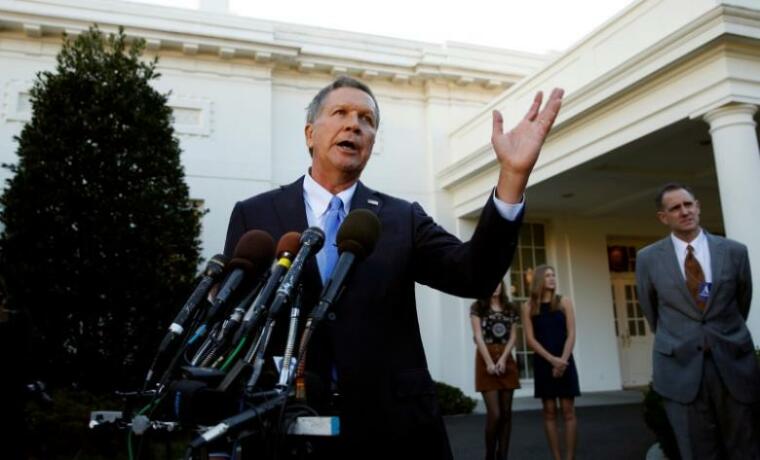Ohio legislators refuse to override Kasich's veto of 'heartbeat bill'

Pro-life advocates in Ohio were dismayed to learn that the state legislators have ended the session on Dec. 28 without overriding Gov. John Kasich veto of a bill that will prohibit abortions once the unborn baby's heartbeat is detected.
The House and Senate had scheduled "if needed" sessions for Dec. 28 and 29 in case they garnered enough support to override vetoes. However, the House sessions were canceled by House Speaker Cliff Rosenberger on Wednesday, Dayton Daily News reported.
Ohio ProLife Action president Linda Theis expressed her disappointment that some lawmakers "paid by taxpayers to work through December 31st chose to be out of town when they knew there was a good chance they would be called back in for the override."
Last month, Kasich vetoed the heartbeat bill while approving a ban on abortions at 20 weeks of pregnancy or later. The governor cited concerns that the bill might be overturned if it is challenged in court, and some Republican lawmakers have feared that the state might be required to pay millions in legal fees.
Brad Mattes, president of Life Issues Institute, said that he was troubled by Kasich's reason for vetoing the measure.
"How can an elected official, who in his own words works 'to strengthen Ohio's protections for the sanctity of human life,' put a price tag on their lives?" Mattes said, according to Life Site News.
Mattes said that the heartbeat bill could potentially reverse Roe v. Wade if President-elect Donald Trump follows through on his promise to appoint pro-life Supreme Court justices.
"We have good reason to believe that the makeup of the U.S. Supreme Court and appellate courts are about to change. It's not unfathomable to think that in the time it would've taken to get the Heartbeat Bill before the Supreme Court we may have a pro-life majority," he wrote.
Ohio Right to Life had expressed its support for Kasich's decision. The group stated that the Supreme Court will still be left with a pro-abortion majority even if Trump fills the current vacancy.
Lawmakers in North Dakota have introduced a similar measure, but it was overturned by a federal appeals court in 2014.
 Christians don't have to affirm transgenderism, but they can’t express that view at work: tribunal
Christians don't have to affirm transgenderism, but they can’t express that view at work: tribunal Archaeology discovery: Medieval Christian prayer beads found on Holy Island
Archaeology discovery: Medieval Christian prayer beads found on Holy Island Presbyterian Church in America votes to leave National Association of Evangelicals
Presbyterian Church in America votes to leave National Association of Evangelicals Over 50 killed in 'vile and satanic' attack at Nigerian church on Pentecost Sunday
Over 50 killed in 'vile and satanic' attack at Nigerian church on Pentecost Sunday Ukrainian Orthodox Church severs ties with Moscow over Patriarch Kirill's support for Putin's war
Ukrainian Orthodox Church severs ties with Moscow over Patriarch Kirill's support for Putin's war Islamic State kills 20 Nigerian Christians as revenge for US airstrike
Islamic State kills 20 Nigerian Christians as revenge for US airstrike Man who served 33 years in prison for murder leads inmates to Christ
Man who served 33 years in prison for murder leads inmates to Christ


 Nigerian student beaten to death, body burned over ‘blasphemous’ WhatsApp message
Nigerian student beaten to death, body burned over ‘blasphemous’ WhatsApp message 'A new low': World reacts after Hong Kong arrests 90-year-old Cardinal Joseph Zen
'A new low': World reacts after Hong Kong arrests 90-year-old Cardinal Joseph Zen Iran sentences Christian man to 10 years in prison for hosting house church worship gathering
Iran sentences Christian man to 10 years in prison for hosting house church worship gathering French Guyana: Pastor shot dead, church set on fire after meeting delegation of Evangelicals
French Guyana: Pastor shot dead, church set on fire after meeting delegation of Evangelicals ‘Talking Jesus’ report finds only 6% of UK adults identify as practicing Christians
‘Talking Jesus’ report finds only 6% of UK adults identify as practicing Christians Mission Eurasia ministry center blown up in Ukraine, hundreds of Bibles destroyed: 'God will provide'
Mission Eurasia ministry center blown up in Ukraine, hundreds of Bibles destroyed: 'God will provide' Church holds service for first time after ISIS desecrated it 8 years ago
Church holds service for first time after ISIS desecrated it 8 years ago Burger King apologizes for 'offensive campaign' using Jesus' words at the Last Supper
Burger King apologizes for 'offensive campaign' using Jesus' words at the Last Supper Uganda: Muslims abduct teacher, burn him inside mosque for praying in Christ’s name
Uganda: Muslims abduct teacher, burn him inside mosque for praying in Christ’s name